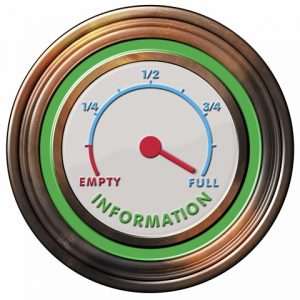Too Much Information

You and I are all constantly bombarded with more and more ‘information’.
Some of this may be useful information we want, but the rest of it is often irrelevant to us or simply rubbish or even harmful.
It’s all a bit like the rays bombarding us through the atmosphere – light, cosmic, ultra-violet and so on – some of which we have to protect ourselves against.
You and I do of course from time to time seek out specific information – to help us in achieving our goals but many people also seem to have a craving for as much as they can get – whatever it is.
They scour the world wide web and so-called ‘social media’, devouring everything they can find, useful or not, seemingly without any sense of purpose.
The other side to this of course is that there are millions of people – yes, myself included – pouring out information in all directions in the hope that others will pick up on what they are saying.
Two questions spring to mind.
Has this anything to do with ‘communication’?
Has this anything to do with ‘knowledge’?
What are people all attempting to do sending out all these blogs, posts, tweets, mailings, videos, photos, comments, and so on?
Is it just about wanting to be ‘noticed’ or simply to brag about what they’ve done or where they’ve been?
Is it just about ‘pitching’ something they want to sell to other people?
Is it about not wanting to feel isolated but be part of some sort of ‘virtual community’?
I don’t think this is quite what Sir Tim Berners-Lee had in mind when he came up with the idea of the World Wide Web.
I think it was more about sharing knowledge and ideas, more about giving people the facility to help others through civilized communication, and more about improving the accessibility of information.
The ‘web’ is an amazing tool that has huge potential to allow people to really communicate with each other.
Tower of Babel
But like the Tower of Babel, which according to legend was constructed to help people communicate with God, ii’s heading in the direction of simply creating more and more confusion.
Texts from many different religions describe how the ‘tower’ was destroyed and how people started to speak in different languages losing their ability not only to communicate with their God but also with each other.
You and I see this happening now, particularly on social media, where although people are perhaps speaking the same ‘language’ they are clearly at cross purposes, taking offence at what someone else has said and being openly hostile to one another, with some even using it for deliberately disruptive or destructive purposes.
The danger is, if we don’t use this resource more carefully, the web (or some parts of it) could just ‘self-destruct’ as people decide that the pain involved is greater than the gain.
There should be no place for anything that would not be said face to face, and no place for gossip ‘behind peoples’ backs’.
Remember (like Vegas) ‘what happens on the web stays on the web’ – but the difference is everyone can see it.
Is this really what everyone wants?
You and I know that the only real way to communicate and get to know each other is on a face to face basis, which includes talking on the phone or using a video link so we can see each other ‘live’.
We can’t really know, or be ‘friends’ with, someone we’ve never met or spoken to. Humanity just doesn’t work like that.
The more people rely on technology such as e-mail, texting and the web to attempt to communicate, the more miscommunication and misunderstanding will grow so let’s not fall into this trap.
It’s fine to use these methods to communicate with people you and I already know (on a face to face basis) but pretending we ‘know’ people we’re ‘connected to’ or are ‘friends’ with on social media just doesn’t cut it.
If you and I want to expand our networks of people we know, then just think about how this worked ‘BC’ (that’s ‘before computers’).
It happened in two ways – by ‘bumping into someone’ or by being ‘introduced’ by a mutual friend or colleague.
The web is ideal for these ways of getting to know other people – we can ‘bump into someone’ on the web and we can be introduced or referred to other people.
But you and I will remember it doesn’t stop there – these new contacts must be ‘validated’ by at least one one-to-one conversation before they can really be counted as a contact or friend.
So let’s make some more real connections with new people. Only then can we talk about what we may be able to offer each other in terms of help or knowledge.

